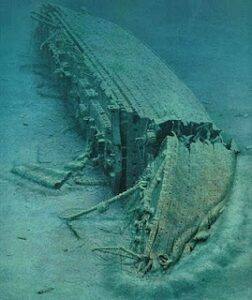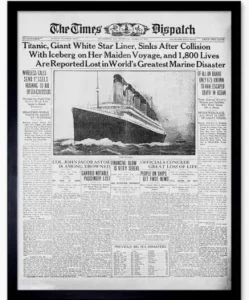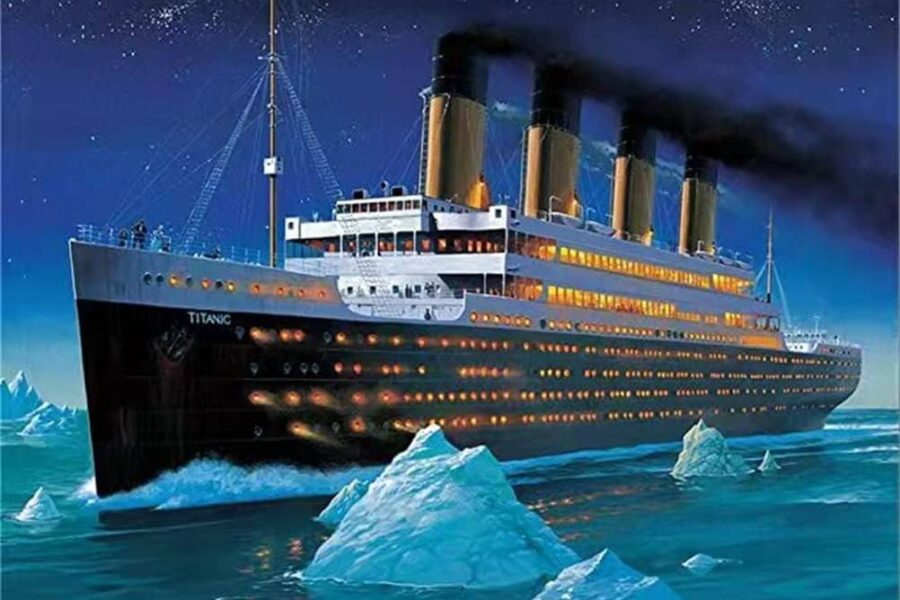The Titanic Century
On Sunday morning April 15, 1912 at 1:30 a.m., something happened that continues to grip the fascination of humanity. After two hours of steady flooding, the huge, unsinkable luxury liner, the Titanic, began to submerge into the icy waters of the Atlantic, four hundred sea miles off the coast of Newfoundland. There were over twenty-two hundred people on board on the Titanic’s maiden voyage from Southampton to New York.
On the previous night, Sunday April 14, just before midnight, those who were still awake could hear a faint scratching sound from the bow. The ship had sideswiped an iceberg on a peerless starry night, with the ocean as flat as a mirror. The starboard side of the hull was ripped open for over three hundred feet, exposing six watertight compartments to the deep, dark sea. The only effect on board was a tinkling of cutlery and glasses. The late-night card games, dancing and chatting could go on. Most of the passengers were already fast asleep, also the poorer ones who were hoping for a better life in a new world on the other side of the Atlantic.
Why should we pay attention to a maritime disaster that occurred one hundred years ago? Because it was an ominous sign from above, for the Christian nations of Europe, of what was going to come unless they humble themselves before the Almighty. A vessel with so much pride was sprinting so smartly to a new world with such promise, only to be mortally nicked by something as ordinary as a drifting iceberg. The result was utter consternation and chaos, a disaster of mammoth proportions, resulting in fifteen hundred souls perishing, and a stunned silence on both sides of the ocean.
Very few understood the lesson. It was all soon forgotten, and hence the twentieth century became the bloodiest in all of history, and Christian Europe changed into secular Europe, with massive effects on each of us today. To this day the West is staggering like a drunken harlot in the dim streetlight of her fading greatness, due to the hangover of those cataclysmic world wars.
That made me think of the message of Jeremiah to the people of Judah centuries ago.
The God of Jeremiah Is the God of History
The prophet Jeremiah is called the weeping prophet or the prophet with the broken heart. He lived in a small village called Anatoth and was called by God at a time when Judah and Jerusalem were unusually stubborn and set in their evil ways. Yet God in His great mercy sent them this man with a stark message of clear warning. In his message God made it abundantly clear: “I am the sovereign Ruler of the destiny of my people, and not only of my own people, but of all nations and peoples on the earth. That’s why you need to listen to Me.”
Jeremiah did not have an easy task. It was so hard that he sometimes wished he had never been born. In chapter 20 he cried out: “Cursed be the day that I was born. Why did I ever come forth from my mother’s womb to see all this labor and sorrow, that my days should be consumed with shame?”
So, what made his life so hard? It was this: He was sent by the living God with a message his own people did not want to hear. And what was it about? It was about the future! Yes, they did not want to touch the topic of the future, at least not from Yahweh’s point of view. El Shaddai, who determines the destiny of individuals, families, tribes and nations was calling for their attention, but they would not listen.
And yet, the Word of the Lord came to Jeremiah saying: “Before I formed you in the womb, I knew you. Before you were born, I sanctified you, I ordained you a prophet to the nations” (1:4–5). When Jeremiah complained that he was no good speaker and too young, the Lord told him “You shall go to whomever I send you, and whatever I command you, you shall speak. Do not be afraid of their faces, for I am with you to deliver you.”
Right after that Yahweh showed him two signs. The first was an almond branch. It carried a very simple message, meaning: “I am watching over my word to perform it” (The words for almond and for watching are the same in Hebrew). The second sign was a boiling pot, tilting over from the north, also a simple message: “Out of the north disaster is going to come on the inhabitants of the land.” Why? Because God’s people have forsaken the fountain of living water, only to cut for themselves cisterns that can hold no water. They have forsaken their Glory for what were no gods (see chapter 2).
While Jeremiah was still overwhelmed by his new task and calling, the Lord bluntly told him: “Dress yourself for work! Arise and go tell them all the words that I command you.”
Consider, only a God of love can send a man like Jeremiah with a message so serious to a people so wayward. Some think a God of love must always speak softly and comfortably. The false prophets of Jeremiah’s day thought so too. The Bible reveals to us a God who cares for this world and especially for his people, for you and me. He is truly the God of history. Therefore, “Let all the earth fear the Lord; let all the inhabitants of the world stand in awe before Him,” says the Psalmist (33:8).
A Phone Call from the Old Country
Years ago, I got an unexpected telephone call from an old friend out of the old country. We knew each other since our army days. Riaan has been doing quite well in business and was just calling to hear how I am doing. Halfway through our conversation he said this: “I am finished with the church. Not with God, but with the church. My wife still wants to argue, but I am done with it. I will just continue to worship God in my home with my family.”
“Why?” I asked. “What made you decide to take such radical step, my friend?” His answer was simple, and I have heard it so many times over the last few decades. This is what he said: “The church [in South Africa] let us down. The church never spoke to our deepest crisis. It let us down. It let us down in the old dispensation [i.e., the Apartheid years], and it is letting us down even more so today [since the end of Apartheid]. The church is irrelevant. It has no prophetic voice, no message for our deepest crisis. The church is only concerned about itself. Ministers want to please everybody. They hang around on golf courses and tea parties instead of sounding the clarion call for a day like this. I am finished with it all.”
Unfortunately, I had no answer. I knew he was right. I heard a similar thing not long ago from a young female Danish reporter, when she was asked why Christianity faded in her own country. For the most part, the church in the country of my birth was a lame duck over the last forty years or so. No wonder the faithful were leaving in droves. But is it really so much different here in North America? Are we willing to talk about the future and the world we are living in? Or is that too unspiritual? Must the church only speak to my little world, my family, my salvation, my comfort, and perhaps my morality, and that’s it? The world is heading for a cataclysm, but the church is basically silent about it all, in fear that it might upset, or even divide its members. Wow!

I saw something similar in a recent biography on the life of Dietrich Bonhoeffer by Eric Metaxas. The church in Germany, for the most part, was in a state of total paralysis during the rise of Hitler. It did not, could not and would not hear God’s voice in the midst of the crisis. And the reason was that it never had a history of men speaking as Jeremiah did. Very few dared to. Their God was not the mighty God of the nations and of history. He was an idol of their making, a God who’s there to make sure we are happy and that we go to heaven.
That is why we can’t let the Titanic sail pass us like a ship in the night, for even the world saw a clear message in its sudden demise. Listen to James Cameron, who made the movie about the 1912 disaster: “The Titanic is a drama about reliance on technology, illustrating the bankruptcy of the things that are promised in the name of progress. I consider its story as symbolic of the twentieth century. We are all sailing on some sort of a Titanic.”
The God of Jeremiah Is the God of the Humble
Let’s return to Jeremiah. Chapter 13 opens with these words: “…the Lord said to me: Go and get yourself a linen sash, and put it around your waist, but don’t put it in water” (Jer. 13:1). The linen cloth, or loincloth, was a single piece of cloth that men wrapped around their waists under their garments. On a hot day, they would wear only the linen cloth, as we often see in illustrations depicting the disciples catching fish.
So, Jeremiah is told to go and buy one of those. Then the word of the Lord came to him a second time: “Take the linen cloth, and go to the Euphrates and hide it there in a hole in the rock [some crevice by the waterside]” (1:3). Jeremiah did as the Lord commanded him. He took the linen cloth and hid it in a crevice, just above the water level of the Euphrates.
“Now it came to pass after many days that the Lord said to him: Arise, go to the Euphrates, and take from there the loincloth that I have commanded you to hide there” (13:6). Jeremiah obeyed. He found the loincloth where it was hidden, and behold: it was spoiled; good for nothing!” It was totally ruined. Useless. But what does it all mean? Here it is: “Then the word of the Lord came to me saying: In this manner will I ruin the pride of Judah and the great pride of Jerusalem!” (13:9). Stunning!
Reading the surrounding chapters in the prophecy, we quickly get a sense how much God hates human pride. He hates the vainglory of His people, and if they won’t listen and humble themselves, then He will certainly come to humble them.
In other words, what goes up must always come down. And nowhere is this truer than in human pride. Either we bring it down ourselves, or God brings it down. “God resists the proud but gives grace to the humble,” says Peter the apostle. “He sees the haughty from afar,” says the Psalmist. “Therefore, humble yourselves under the mighty hand of God, that He may exalt you in due time” (1 Peter 5:6).
The Lord says He is going to ruin the pride of Judah and the great pride of Jerusalem, just like that linen cloth has been ruined. Notice however, that the word for “pride” can also be translated as “glory.” So the Lord is saying: “I am going to ruin the glory of Judah and the great glory of Jerusalem!”
Pride and glory go hand in hand, don’t they? What makes us boastful and proud? The glorious stuff we depend upon. The things we glory in. It could be anything, our money and possessions, cars, homes, boats, national armies and sports teams—you name it—even our healthy bodies and pretty looks, our oratory or famous friends, our great learning or experience, our image and status, our tools and technology… whatever.
Almost unseen, we rely more and more on these things until we glory in them, for they determine who we are. No, not the Lord, not his grace and promises, but all this stuff defines our very identity, attitude, and demeanour. And so, we despise the Rock of our Salvation; the soft flowing water of Shiloah (Is. 8:5). God and His Word get pushed out. We bring more and more sacrifices to our false gods. Just think for a moment: what makes you feel good about yourself? Or what makes you feel inferior perhaps? What do we spend our time, money, strength and worries on? What makes us feel just little bit better (or worse) than others, not only other individuals, but other groups and nations? What are those things that cause us to push the Lord and his glory aside, day after day? And what if a living God hates all of this with a vengeance? What if he is looking instead for humble gratitude and praise? Can you now see where the Titanic comes in?
A linen cloth was meant to cleave to your body, around your waist; to protect and cover your shame. Listen to verse 11: “… so I have caused the whole house of Israel and Judah to cling to me, that they may become my people, for renown for praise, and for glory . . . but they would not hear.” Judah’s calling was to cleave to the Lord. To be His praise among all people. And Jesus told us the same in his Sermon on the Mount. We Christians were called to be salt to the earth and a shining city on a hill.
And so listen to Jeremiah 9:23–24: “Let not the wise man glory in his wisdom, let not the mighty man glory in his might, let not the rich man glory in his riches, but let him who glories glory in this: that he understands and knows Me, that I am the Lord exercising lovingkindness, judgment, and righteousness in the earth, for in these I delight, says the Lord.”
Europe at the Start of the 1900s
Back to the Titanic. Was that glorious ship not the pride of its builders and nations? Was it not considered unsinkable? But indeed, a vessel so proud, sailing so smartly, toward a world so wonderful, was gashed open by something so cold and ordinary as ice. And that became the story of the whole century.
One hundred years ago, the Christian West was filled with untold optimism, not in God mind you, but in man and his achievements. There was this indomitable confidence in technological progress because we have invented things like elevators, automobiles, airplanes, and a wireless radio. Everything seemed to be in a wondrous upward spiral. Progress was the word on everyone’s lips. Eternal progress. A well-known academic of Groningen in the Netherlands says of those days that it was even said then that all our learning and education would bring an end to prisons and crime.
One hundred years ago Europe was Christian. There was no rival to Christianity anywhere in sight. Missionary leaders gathering in Edinburgh in 1910 spoke of winning the entire globe for Christ in their generation. Reformed leaders in Holland dreamed about the Reformed faith covering the earth.
But then it all came crushing down. And look where we are today. Millions upon millions died in two world wars, started by “Christian” nations. And since then, first Europe and then the rest of the West turned its back on God. The entire moral fabric of the West is in total rags, just like that linen cloth, worthless. Riots are everywhere. Most Western countries are financially bankrupt and printing money like crazy to stay afloat. Western leaders are capitulating to radicals just to stay in power. And then, arriving at the gates of our once indomitable Western Civilization, are none other than our 1400-year-old mortal enemy: Islam. But again, only a few dare to speak plainly about the future— and paying a heavy price for it. They are being called bigots, racists, far-right, or something worse.
That is where pride and glory got us. Obama still boasted: “We can!” Yes, we can control our own future and shape our own destiny. He was also the one that definitively declared that America is no more a Christian nation. Not the Lord, whose Word once made us great, was our glory. We were! And so today chapels are turned into mosques and cathedrals into concert halls, if at least they are not being burned down by the dozens. Hubris and autonomy brought us misery. And everywhere leftist and Islamic revolutionaries rejoice.
When the Great War broke out in 1914 as a direct result of Europe’s pride the rest of the earth looked on in shock. Christian nations grabbed each other by the throat, for nothing. Protestant nations once known for sending thousands of missionaries to a lost world were now slaughtering each other in the trenches like animals. Albert Schweitzer labouring in Gabon at the time, had a difficulty explaining it all to the Africans, and so he began to wrestle about the very meaning of the word “civilization.” Out of the rubble of those wars arose a godless, secular and proudful man, with no place for God or his Word anymore. Soon the churches began to run empty, in spite of German Chancellor Konrad Adenauer telling Billy Graham in the wake of WWII, while staring out of his window: “Outside of the resurrection of Christ, I know of no hope for the world.” Why would the children sit in the pews of parents, who began such a slaughter party in 1914, and then do it all over another time? Then in the 1940s the perverted Kinsey Reports on human sexuality (in the US) gave us Play Boy magazines and the Beatles gave us free love, drugs and Eastern mysticism. And in the wake of student revolutions on both sides of the pond, Pink Floyd sang with gusto “leave them kids alone!”
Surely, the prophecy has been fulfilled. The linen cloth is useless. The Lord has made our Christian nations like that linen cloth, useless, good for nothing. He humbled the pride of Judah and the great pride of Jerusalem. A proud sinking ship (in God’s merciful providence) was intended to get our attention, but alas!

The God of Jeremiah Is the God of the Future
Should all of this leave us in despair? Absolutely not! The God of Jeremiah is above all the God of hope. Let us not be morbid or sad. He tells us to rid our hearts of every idol. He sent Jesus his Son not only to deliver us from judgment but also to place our feet on a rock while the world is floating down in the slipstream of history to the inevitable chasm of the Last Day.
Listen to God’s word in Jeremiah 17:5–8:
“Cursed is the man who trusts in man, and makes flesh his strength, whose heart departs from the Lord. For he shall be like a shrub in the desert, and shall not see when good comes, but shall inhabit the parched places of the wilderness, of a salt land not inhabited . . . but blessed is the man who trusts in the Lord, whose hope is in the Lord. For he shall be like a tree planted by the waters, which spreads its roots out by the river; he will not fear when the heat comes, but his leaf will be green, and he will not be anxious in the year of drought, nor will he cease from yielding fruit.”
The future belongs to Jesus, to Him who conquered sin and hell and who was seated in glory above every power and principality, both in this world and the next, who has defeated death and Satan through his cross and resurrection. He is the King of kings and Lord of lords. Our God reigns and he is absolutely in control.
He gave the exiles in Babylon—that small hopeless remnant—a message of hope when they had no idea what was going to happen to them. In the midst of their deep humiliation, God said to them: “For I know the thoughts that I have concerning you, says the Lord, thoughts of peace and not of evil, to give you a future and a hope.”
Praise God for these wonderful words!
God has a future for his people in this world. He will yet again exalt them and use them to His praise and glory. He tells the believing remnant in chapter 29 not to stop living, nor to look around in panic, but to dwell in Babylon and keep on living with hope. Build houses, plant gardens, marry and have children and seek the peace of this city, for the future belongs to Me. I am watching over my Word to bring it to fulfillment.
If that was true for them, how much more for us! Don’t stop to live and to love and to raise your children in hope. And please, seek the peace—the wellbeing—of the place where God has put you. Don’t abandon your country or city. Pray for its wellbeing and peace, and reach out to its people. They too need to see that our God is righteous and merciful.
Vow to God never again to follow your own heart and to bow to the idols of this world. If you seek him, you will find Him, when you seek him with all your heart. Cling to the Lord of hosts, like that linen cloth to a man’s waist. And the Lord will let himself be found by us, old and young. He will gather us and bless us as He gathered his people and brought them back to their own land.
The future belongs to the Lord, both in this age and in the age to come. He will prosper us, and He will provide for us whatever we need. For, if God is for us, wrote Paul, who or what can be against us? And he is for sure for all those who are in his Son Jesus Christ. In him your leaf will always be green, and your fruit abiding, for you will be planted by a stream that will sustain you through every year of drought, as long as you call on the wonderful name of Jesus.
There was a young man on the Titanic named Jack Phillips. While everybody was rushing to the deck, he stayed at his post in the stern of the ship, sending out distress signals. Were it not for his heroic bravery, many more than fifteen hundred would have perished. But he stuck to his difficult task to the very end. His last signal went out at seventeen minutes past two in the morning, three minutes before the stern sank. His body was never found.
Apart from living wisely and trusting God alone, apart from listening to His voice and to no other, our calling in this world is to do exactly what that young man did. Put duty first, always, duty to God, to your neighbor, to your family, to your church, to your country. Never put first your own desires or ambitions, not even your desire to survive, but duty to God and man, above all the household of God, even while the ship is sinking.
Send out those distress signals to the very last moment, even if the water is coming up to your neck. And what are those signals? The wonderful message of salvation in Jesus Christ. Whoever trusts in him will never be put to shame. No other name was given through which we may be saved. He is the lifeboat that will take us safely to the other side. He will for sure save whoever calls on His name!
So let us now sing the song that the band played as that great ship went down: Abide with me.
* Based on a sermon preached in 2012.







